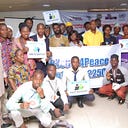Lessons from 2001 Nobel Peace Prize Winner- Kofi Annan

“A conscience keeper of international peace and security.” as described by Indian Prime Minister, Narendra Modi, Kofi Annan stands tall as one of the greatest peacebuilding icons from the African continent. The first sub-Saharan African to become the Secretary-General of the United Nations (UN). Kofi was awarded the Nobel Peace Prize of 2001 along with the UN “for their work for a better organised and more peaceful world.” Who is this African giant?
Kofi Annan was born on the 8th of April 1938, to a Ghanaian family and studied in Geneva. He joined the UN in 1962, working for the World Health Organization’s Geneva office and spent his entire life in the United Nations system rising through the ranks to become the UN Secretary-General from 1997 to 2006. As the first Secretary-General to be elected from the UN staff, he was a fervent advocate for peace, sustainable development, human rights and the rule of law. Although his legacy includes some controversies around his perceived inability to properly handle the Rwandan genocide of 1994 and the Srebrenica Massacre of 1995, Kofi pushed for reforms to rebuild the UN making it more effective and brought the UN to the 21st century, while working extensively on poverty eradication/alleviation in countries around the world constantly seeking greater stability and peacekeeping efforts.
Kofi Annan was committed to containing the spread of the HIV/AIDS virus in Africa when the rest of the world stood still. As the virus raged across the continent, Kofi Annan met with influential African leaders and the Organisation of African Union (OAU), now known as African Union (AU) to strategise on curbing the virus and other highly infectious diseases, especially among young adults. His strong leadership helped Africa to contain it by promoting its test and treatment and pushing for enhanced healthcare systems on the continent. He was committed to the fight against the virus to protect and preserve the future of Africa.
Kofi Annan, made his work on peace a personal goal and reemphasized the UN’s focus on advocacy on conflict prevention and peacebuilding. He raised support for children in Afghanistan and other underdeveloped countries by amplifying their voices and striving for a more peaceful world. Prevention of conflict is mainly a national responsibility but Kofi Annan made it a responsibility of the UN too when the national body failed to protect or abuse its people by reawakening the UN peacekeeping department and introduced the Responsibility to Protect doctrine (R2P). He is a man of integrity as he injected openness and transparency into the UN system thereby making UN officials more aware of the impact of their actions and inactions on vulnerable populations. He also contributed to and supported the civilian rule in Nigeria, making democracy in Nigeria possible today.
Kofi Annan remains a great mentor to me and other youth around the world. He believed in the strong difference youths can make in peacebuilding and politics by supporting free and fair elections, empowering young leaders to counter violent extremism and supporting a strive for a more peaceful world. According to one of his quotes, “Peace is not a perfect achievement” therefore it has to be consciously worked at, as it often comes after a period of war, but also gives hope; hope for a better life, a better society, a healthy life and a land that can flourish again. Kofi Annan died at the age of 80 on August 18, 2018, a fulfilled age, having lived a life full of great and positive impacts. May he continue to rest in peace and his legacies grow stronger, better and impacting. On this occasion of the 2nd anniversary of his death, I am glad to reflect on what his legacy means to young people.

Kofi Annan is such a powerful mentor for youth peacebuilders especially on the continent of Africa. Here is why:
1. Change the ineffective status quo. Kofi realized that the United Nations was unable to intervene in major crises such as the Rwandan Genocide of 1995 and the Srebrenica Massacre of 1999 because of the principle of sovereignty that says governments have full control of what happens in their country without any interference from outsiders. Kofi felt this was deadly and governments could use it to harm their citizens so he created the concept of Responsibility to Protect (R2P) in 2001 to ensure that the international community steps in to protect citizens from their oppressive governments. In the same vein, youth-led organisations such as Building Blocks for Peace Foundation (BBFORPEACE) are demanding a change in their perception by governments and other stakeholders from perpetrators of violence to shapers of peace.
2. Fight for Africa’s development. Kofi made it clear that Africans had the primary responsibility to develop the continent. He emphasised the importance of education to its teeming young population and worked closely with African leaders through their member-states and the Organisation of African Unity. Likewise, BBFORPEACE is collaborating with dozens of organisations across Africa to advocate for peace and security on the African continent.
3. Respond to emerging challenges quickly. HIV/AIDS was a major security threat at the beginning of the millennium in 2000. Africa, in particular, was in danger of being overwhelmed due to inadequate health support systems and health personnel as well as widespread illiteracy. Kofi swung into action leading massive sensitization adopting UNSCR 1308 identifying AIDS as a global security threat in 2000 and convening the General Assembly Special Session on HIV/AIDS in 2001. As young peacebuilders, we cannot wait to start tackling societal challenges. It starts right now- from you and me!
Written by:
Matesun Oluwabukunmi,
Welfare Team,Building Blocks for Peace Foundation
info@bbforpeace.org
